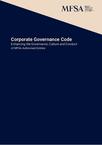
New MFSA Corporate Governance Code for Authorised Entities
To this effect, the MFSA has initiated a month-long consultation ending on the 22nd March 2022, whereby any authorised entities and practitioners are encouraged to submit any feedback.
In the herein linked circular, the MFSA explains that the Code’s primary objective is to set out best practices in corporate governance for Malta’s financial services sector and to support their adoption across the board on the basis of the proportionality principle. In light of the said principle, not all the Code’s proposed policies may be deemed applicable within the context of the activities undertaken by the authorised entity, thus their application should be determined on a case-by-case basis. Some policies may be applied to a certain extent given that some entities may perform very limited activities or are more of a small Board and organisation structure.
The Code notably regulates the responsibilities of the Board of Directors, internal controls (Risk Management, Compliance, Internal Audit, ICT and Security Risk Management and Business Continuity), stakeholder engagement and corporate culture, Corporate Social Responsibility, and Environmental, Social and Corporate Governance. In doing so, the Code shall strive to foster and enhance financial sustainability and accountability, optimal stakeholder relationship, board oversight, and a holistic culture of proper governance.
It is pertinent to note that the Code shall not prevail over current applicable laws, regulations or rules which already cater for internal corporate governance of certain authorised entities. For instance, in the banking sphere, in view of the fact that the internal governance of banks is enshrined in the Banking Rules and in numerous European Banking Authority Guidelines, the latter governance frameworks shall take precedence over the Code. Hence, those regulated sectors regulated by unwritten customary laws shall now primarily be governed by the Code, thereby paving the way for more legal certainty in this rather grey area.



